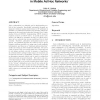Free Online Productivity Tools
i2Speak
i2Symbol
i2OCR
iTex2Img
iWeb2Print
iWeb2Shot
i2Type
iPdf2Split
iPdf2Merge
i2Bopomofo
i2Arabic
i2Style
i2Image
i2PDF
iLatex2Rtf
Sci2ools
111
click to vote
MOBIHOC
2002
ACM
2002
ACM
Weak duplicate address detection in mobile ad hoc networks
Auto-configuration is a desirable goal in implementing mobile ad hoc networks. Specifically, automated dynamic assignment (without manual intervention) of IP addresses is desirable. In traditional networks, such dynamic address assignment is often performed using the Dynamic Host Configuration Protocol (DHCP). Implementing DHCP, however, requires access to a DHCP server. In mobile ad hoc networks, it is difficult to guarantee access to a DHCP server, since ad hoc networks can become partitioned due to host mobility. Therefore, alternative mechanisms must be employed. One plausible approach is to allow a node to pick a tentative address randomly (or using some locally available information), and then use a "duplicate address detection" (DAD) procedure to detect duplicate addresses. The previously proposed DAD procedures make use of timeouts and do not always perform correctly in presence of partitions. In networks where message delays cannot be bounded, use of timeouts can le...
Related Content
| Added | 24 Dec 2009 |
| Updated | 24 Dec 2009 |
| Type | Conference |
| Year | 2002 |
| Where | MOBIHOC |
| Authors | Nitin H. Vaidya |
Comments (0)

